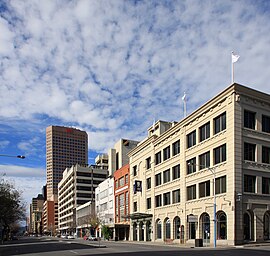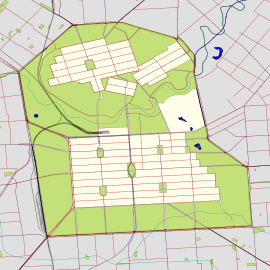Currie Street
Currie Street | |
|---|---|
 | |
| The south side of Currie Street, looking east from Light Square | |
 | |
| Coordinates | |
| General information | |
| Type | Street |
| Location | Adelaide city centre |
| Length | 1.1 km (0.7 mi)[1] |
| Opened | 1837 |
| Major junctions | |
| West end | Glover Avenue Adelaide |
| East end | King William Street Adelaide |
| Location(s) | |
| LGA(s) | City of Adelaide |
Currie Street is a main street in the Adelaide city centre, South Australia.[2][3] It runs east–to–west from King William Street, through Light Square, to West Terrace on the western edge of the city centre.
History




The street was named after British MP Raikes Currie (1801–1881), a founder of the South Australian Company and treasurer of the South Australian Church Society. The street was named after Currie by the Street Naming Committee in 1837.[4]
English benefactor William Augustine Leigh (1802–1873),[5] who bought many parcels of land in South Australia through his agent Sir John Morphett, bought two town acres[6] between Currie and Hindley Streets. Hence the naming of Leigh Street,[7] a now pedestrianised street between the two, and a popular dining precinct.[8]
Thomas Topham Petheridge, of Plymouth, was a land grantee of Town acre 138 on Currie Street's south side, and of Town acre 176 on Waymouth Street's north side.[9] Topham Street, now closed, which ran between Currie and Waymouth Streets over the land granted to Petheridge, was named eponymously.[10] The street is now the site of Topham Mall.[11]
The Currie Street Model School, one of four "model schools" in the city centre, was established in 1893.[12]
In July 2012, bus lanes were introduced along the full length of Currie Street.[13][14]
Continuing east and west
Glover Avenue
The street changes its name to Glover Avenue at West Terrace. It continues west through the Adelaide Park Lands and Bakewell Underpass. Glover Avenue was opened in 1925 and was named after the previous Lord Mayor of Adelaide, Charles Richmond Glover. The Bakewell underpass opened in 2008. It replaced the Bakewell Bridge which opened with Glover Avenue in 1925. The Bakewell Bridge was named after Edward Bakewell, the chairman of the Municipal Tramways Trust.[15]
The purpose of the Bakewell Bridge was to reduce motor vehicle and tram traffic congestion on limited routes between the western suburbs and the Adelaide city centre. Glover Avenue and the Bakewell Bridge replaced a level crossing and Henley Beach Road crossing the parklands on a different alignment. The bridge carried tram and motor traffic over some busy railway lines.[16] The trams were removed in the 1950s.
The bridge continued in use until it was in need of replacement. It was demolished in 2006. The bridge was replaced by the Bakewell Underpass which continued under James Congdon Drive to provide a grade-separated intersection. It opened for traffic in January 2008.[17][18]
Henley Beach Road
It then changes name to Henley Beach Road as it continues through the western suburbs to the seaside, terminating at Henley Beach South.
Prior to construction of Glover Avenue in 1925, Henley Beach Road did not align to Currie Street. Glover Street veers right (north) from Currie Street. Prior to its construction, Henley Beach Road crossed the railway at a level crossing and continued as Mile End Road straight across the Adelaide Park Lands to align with Hindley Street. The tram line followed North Terrace and the first part of Port Road on the bridge over the railway, then swung south to join Henley Beach Road.[19]
Grenfell Street
On the east side of King William Street, it changes name to Grenfell Street. A common belief for the name change that happens at King William Street with Grenfell/Currie St is that the namers believed no one should be able to cross the King's path. This applies to all streets that meet King William Street.[20][21]
Notable buildings
Queen's Theatre
The Queen's Theatre, on Playhouse Lane and connected to Currie Street by Gilles Arcade, is the oldest theatre in mainland Australia. Built in 1840, the façade dates from 1850. The building has had a number of uses:
- 1840–1842 Queen's Theatre & Shakespeare Tavern
- 1843–1850 Supreme Court & Temple Tavern
- 1850–1868 Royal Victoria Theatre & Theatre Tavern
- 1877–1928 Horse and Carriage Bazaar
- 1928–1988 Car park and light industry
The building is now owned by Arts South Australia. After a partial restoration in the 1990s, is now used as a performance space and function venue.[citation needed]
Edinburgh Castle
The Edinburgh Castle Hotel, referred to colloquially as the Ed Castle, or The Ed,[22] was a pub located at 233-239 Currie Street, on the corner of Currie and Gray Streets.[23] It was opened in 1837, making it the longest trading licensed premises in Adelaide city centre, and became a popular venue for live music.[24]
The building was locally heritage-listed on 27 March 2013, under the following criteria:[23]
- Criteria A: it displays historical, economic or social themes that are of importance to the local area
- Criteria E: it is associated with a notable local personality or event
- Criteria F: it is a notable landmark in the area
Known for its popularity as a live music venue and beer garden, the pub was forced to in September 2018, owing to construction of a new student accommodation tower block and roadworks. Tony Bond, who previously ran Gallery 139 on Magill Road, said that turnover had decreased from $1.1million over the period November 2016 to June 2017 to $760,000 over the same period the following year, and the business could not be sustained.[25]
After reopening after a major renovation under new management on 15 December 2023, and live music resumed at the venue on 2 February 2024. However, the business once again closed on 12 February 2024.[22]
See also
References
- ^ "Currie Street" (Map). Google Maps. Retrieved 1 June 2022.
- ^ 2003 Adelaide Street Directory, 41st Edition. UBD (A Division of Universal Press Pty Ltd). 2003. ISBN 0-7319-1441-4.
- ^ Map Archived 25 March 2017 at the Wayback Machine of the Adelaide city centre, North Adelaide and the Adelaide Park Lands.
- ^ Nicholas, Jeff (2016): Behind the streets of Adelaide, Vol. 2. From Rundle to Morphett. Torrens Press. ISBN 9780994533005
- ^ Press, Margaret M. "Leigh, William Augustine (1802–1873)". Australian Dictionary of Biography. Published first in hardcopy 2005. Canberra: National Centre of Biography, Australian National University. ISBN 978-0-522-84459-7. ISSN 1833-7538. OCLC 70677943. Retrieved 25 July 2019.
- ^ "Town Acre Reference Map - Map of the City of Adelaide". South Australian Government. Data SA. Retrieved 25 July 2019.
- ^ denisbin (6 April 2012). "1854 Bible Christian Methodist Church Clarendon, Adelaide Hills South Australia". Flickr. Retrieved 25 July 2019.
- ^ Mack, Melissa (25 September 2013). "Leigh Street to stay closed". InDaily. Retrieved 25 July 2019.
- ^ "EARLY ADELAIDE". The Register (Adelaide). South Australia. 27 December 1913. p. 18. Retrieved 22 January 2020 – via Trove.
- ^ Nomenclature of the Streets of Adelaide and North Adelaide (PDF). State Library of South Australia. Retrieved 22 January 2020.
- ^ Carol Fort (2008). Keeping a Trust: South Australia's Wyatt Benevolent Institution and Its Founder. Wakefield Press. p. 37. ISBN 978-1-86254-782-7.
- ^ "Government's model and practising schools in city set the standards for South Australian teachers in early 1870s". AdelaideAZ. Retrieved 23 December 2022.
- ^ Installation of bus priority lanes Grenfell Street, Currie Street & East Terrace Department of Planning, Transport & Infrastructure May 2012
- ^ Adelaide bus lanes Australian Bus issue 53 September 2012 page 6
- ^ "NEW CITY FACILITIES". The Register (Adelaide). Vol. XC, no. 26, 518. South Australia. 23 December 1925. p. 10. Retrieved 9 February 2019 – via National Library of Australia.
- "THE LUNCHEON". The Register (Adelaide). Vol. XC, no. 26, 518. South Australia. 23 December 1925. p. 10. Retrieved 9 February 2019 – via National Library of Australia.
- ^ "MUNICIPAL EFFICIENCY". The Register (Adelaide). Vol. XC, no. 26, 518. South Australia. 23 December 1925. p. 8. Retrieved 9 February 2019 – via National Library of Australia.
- ^ "Placename Details: Bakewell Underpass". Property Location Browser Report. Land Services, Department of Planning, Transport and Infrastructure, Government of South Australia. 6 September 2010. SA0038266. Archived from the original on 12 October 2016. Retrieved 9 February 2019.
- ^ "Bakewell Underpass". Department of Planning, Transport and Infrastructure, Government of South Australia. Archived from the original on 9 March 2019. Retrieved 9 February 2019.
- ^ Fuller, W. G. (1920), Reference map of Adelaide and suburbs, W. G. Fuller, retrieved 10 February 2019
- ^ Adelaide, King William Street; Australia, S. A. "King William Street | Adelaidia". adelaidia.sa.gov.au. Retrieved 9 February 2020.
- ^ "AdelaideAZ". adelaideaz.com. Retrieved 9 February 2020.
- ^ a b "Why a renovated Ed Castle closed two months after reopening". InDaily. 16 February 2024. Retrieved 1 December 2024.
- ^ a b "Hotel (Edinburgh Castle)". Experience Adelaide. 16 September 2019. Retrieved 1 December 2024.
- ^ Rice, Katelin (2 November 2023). "Adelaide's historic Edinburgh Castle Hotel set to be resurrected under new management". Glam Adelaide. Retrieved 1 December 2024.
- ^ Fanning, Joshua (27 September 2018). "The Ed Castle debacle proves politicians must step up". CityMag. Retrieved 1 December 2024.

